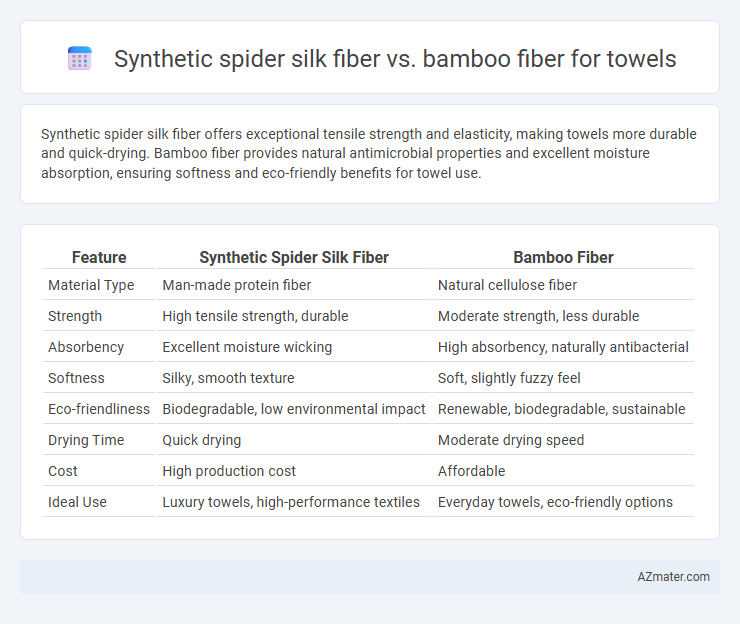Synthetic spider silk fiber offers exceptional tensile strength and elasticity, making towels more durable and quick-drying. Bamboo fiber provides natural antimicrobial properties and excellent moisture absorption, ensuring softness and eco-friendly benefits for towel use.
Table of Comparison
| Feature | Synthetic Spider Silk Fiber | Bamboo Fiber |
|---|---|---|
| Material Type | Man-made protein fiber | Natural cellulose fiber |
| Strength | High tensile strength, durable | Moderate strength, less durable |
| Absorbency | Excellent moisture wicking | High absorbency, naturally antibacterial |
| Softness | Silky, smooth texture | Soft, slightly fuzzy feel |
| Eco-friendliness | Biodegradable, low environmental impact | Renewable, biodegradable, sustainable |
| Drying Time | Quick drying | Moderate drying speed |
| Cost | High production cost | Affordable |
| Ideal Use | Luxury towels, high-performance textiles | Everyday towels, eco-friendly options |
Introduction to Synthetic Spider Silk and Bamboo Fibers
Synthetic spider silk fiber offers exceptional strength, elasticity, and lightweight properties, making it an innovative material for towels that provide durability and soft texture. Bamboo fiber, derived from bamboo pulp, is naturally antibacterial, highly absorbent, and eco-friendly, contributing to sustainable and gentle towels suitable for sensitive skin. Both materials enhance towel performance, with synthetic spider silk emphasizing advanced functionality and bamboo fiber focusing on natural comfort and sustainability.
Production Processes of Synthetic Spider Silk and Bamboo Fibers
Synthetic spider silk fiber is produced through bioengineering methods involving genetically modified microorganisms that synthesize silk proteins, which are then spun into fibers mimicking the natural spider silk's strength and elasticity. Bamboo fiber production involves mechanical crushing of bamboo stalks followed by enzymatic or chemical treatment to separate cellulose fibers, resulting in a natural, biodegradable material. Both processes emphasize sustainability, but synthetic spider silk relies heavily on advanced biotechnology, whereas bamboo fiber utilizes traditional, eco-friendly extraction techniques.
Physical Properties Comparison: Strength, Softness, and Absorbency
Synthetic spider silk fiber exhibits exceptional strength, surpassing traditional fibers with tensile strength up to 1.5 GPa, making towels highly durable and long-lasting. Bamboo fiber offers superior softness, enhanced by its natural microstructure that provides a smooth, gentle feel ideal for sensitive skin. In terms of absorbency, bamboo excels with moisture-wicking properties up to 40% higher than cotton, while synthetic spider silk fibers maintain moderate absorbency paired with faster drying times.
Sustainability and Environmental Impact
Synthetic spider silk fiber offers superior biodegradability and requires significantly less water and pesticides compared to bamboo fiber, making it a more sustainable option for towel production. Bamboo fiber cultivation often involves intensive chemical processing and high water consumption, contributing to environmental degradation despite bamboo's rapid growth. Both fibers reduce reliance on traditional cotton, yet synthetic spider silk's low-impact production and effective resource use position it as the environmentally preferable towel material.
Hypoallergenic and Antimicrobial Features
Synthetic spider silk fiber offers superior hypoallergenic properties due to its protein-based composition that minimizes skin irritation, making it ideal for sensitive skin in towel applications. Bamboo fiber naturally contains antimicrobial agents like bamboo kun, which inhibit bacterial growth and reduce odor, enhancing towel hygiene. Both fibers provide effective solutions, but synthetic spider silk excels in skin compatibility while bamboo fiber emphasizes natural antimicrobial benefits.
Durability and Longevity in Everyday Use
Synthetic spider silk fiber exhibits exceptional durability and longevity in everyday towel use due to its high tensile strength and resistance to wear and tear, outperforming traditional textiles. Bamboo fiber towels, while naturally antibacterial and soft, tend to have lower tensile strength and can degrade more quickly with frequent washing and heavy use. Choosing synthetic spider silk fiber ensures towels maintain structural integrity and performance over prolonged periods, offering superior lifespan compared to bamboo fiber options.
Cost and Market Availability
Synthetic spider silk fiber offers high tensile strength and durability but remains expensive due to complex production processes and limited commercial scalability. Bamboo fiber provides a cost-effective alternative with natural antibacterial properties and widespread market availability, making it a popular choice for eco-friendly towels. Market trends show bamboo fiber dominating budget-friendly segments, while synthetic spider silk targets premium, performance-focused niches.
Comfort and Skin Sensation
Synthetic spider silk fiber offers exceptional softness and smoothness, closely mimicking natural silk, which provides a luxurious and gentle feel ideal for sensitive skin. Bamboo fiber is naturally breathable and moisture-wicking, delivering a cooling sensation and reducing itchiness, making it comfortable for everyday towel use. Both fibers offer hypoallergenic properties, but synthetic spider silk excels in strength and elasticity, enhancing durability without compromising softness.
Washing and Maintenance Requirements
Synthetic spider silk fiber towels exhibit exceptional durability and resist frequent washing damage due to their molecular structure, allowing for gentle machine wash and quicker drying times compared to bamboo fiber towels. Bamboo fiber requires careful washing in cold water with mild detergents to maintain its softness and antimicrobial properties, as high temperatures and harsh chemicals can degrade its natural fibers. Both materials benefit from air drying to prolong their lifespan, but synthetic spider silk fibers generally demand less maintenance and retain their quality over extended use and multiple wash cycles.
Future Trends and Innovations in Towel Fabrics
Synthetic spider silk fiber offers exceptional strength, elasticity, and moisture-wicking properties, positioning it as a cutting-edge innovation in towel fabrics. Bamboo fiber remains popular for its natural antibacterial qualities and sustainability, but ongoing advancements aim to enhance its softness and durability. Future trends emphasize hybrid blends combining synthetic spider silk with bamboo fiber to create towels that maximize comfort, absorbency, and eco-friendly performance.

Infographic: Synthetic spider silk fiber vs Bamboo fiber for Towel
 azmater.com
azmater.com